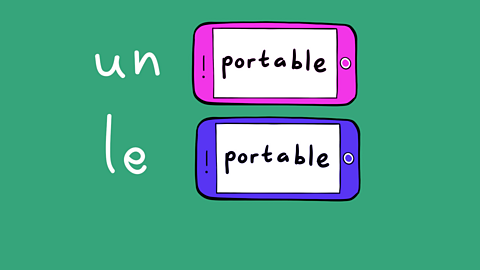The present tense: How to talk about what you do in French
If you are doing something right now then that's the present tense…
Attends! J'ai un message - Wait! I have a message.
Où es-tu? - Where are you?
Je suis dans ma chambre - I'm in my bedroom.
Où es-tu? - Where are you?
Je fais is the present tense of the verb faire - 'to do' or 'to make':
je fais - I do, I am doing
tu fais - you do, you are doing
il fait - he does, he is doing
elle fait - she does, she is doing
Je fais mes devoirs. Qu'est-ce que tu fais? - I am doing my homework. What are you doing?
Je regarde les jeux vidéo des vloggers - I am watching vloggers play video games.
Je regarde is the present tense of regarder to watch.
Regarder is an -er verb and there are lots of -er verbs which follow the same pattern:
je regarde - I watch, I am watching
tu regardes - you watch, you are watching
il regarde - he watches, he is watching
elle regarde - she watches, she is watching
Je prends le bus - I'm taking the bus.
Je prends is the present tense of the verb prendre - to take:
je prends - I take, I am taking
tu prends - you take, you are taking
il prend - he takes, he is taking
elle prend - she takes, she is taking
Tu prends le bus? - Are you taking the bus?
Oui… je prends le bus - Yes, I am taking the bus.
There's nothing like living in the present.Allons-y! - Let's go!
When to use the present tense
You use the present tense to give facts, to talk about what you do on a regular basis, and to say what you are doing right now.
- Je mange une pomme - I am eating an apple OR I eat an apple.
- Tu vas au cinéma? - Do you go to the cinema? (on a regular basis) OR Are you going to the cinema (right now)?
- Il joue au hockey - He plays hockey OR He is playing hockey.
How to use regular -ER verbs in the present tense
Rule: Remove the -er from the end of the infinitive and add the appropriate ending for each pronoun.
Infinitives are the basic form of a verb, before any changes for tense or people are made - like jouer (to play) or vendre (to sell).
For example, jouer (to play):
| French pronoun | stem | ending | Example |
|---|---|---|---|
| je | jou | -e | je joue - I play |
| tu | jou | -es | tu joues - you play |
| il / elle | jou | -e | il / elle joue - he / she plays |
- Je joue au rugby le weekend, mais il joue au tennis - I play rugby at the weekend, but he plays tennis.
There are lots of other -ER verbs that follow the same rule:
- manger - to eat
- regarder - to watch
- écouter - to listen to
- habiter - to live
- aimer - to like
- parler - to speak
- détester - to hate
How to use regular -IR verbs in the present tense
Rule: Remove the -ir from the end of the infinitive and add the appropriate ending for each pronoun.
For example, finir (to finish):
| Pronoun | Stem | ending | Example |
|---|---|---|---|
| je | fin | -is | je finis - I finish |
| tu | fin | -is | te finis - you finish |
| il / elle | fin | -it | il / elle finit - he/she finishes |
- Je finis mes devoirs - I finish / am finishing my homework.
Regular -RE verbs in the present tense
Rule: Remove the -re from the end of the infinitive and add the appropriate ending for each pronoun.
For example, vendre (to sell):
| French pronoun | Stem | ending | Example |
|---|---|---|---|
| je | vend | -s | je vends - I sell |
| tu | vend | -s | tu vends - you sell |
| il / elle | vend | (no ending) | il / elle vend - he / she sells |
- Tu vends ton portable? - Are you selling your mobile phone?
Irregular verbs
Some common French verbs are irregular - such as avoir (to have) and être (to be) - which means they don’t have the same endings as regular verbs.
Here are some useful irregular verbs:
aller - to go
- je vais - I go
- tu vas - you go
- il / elle va - he / she goes
boire - to drink
- je bois - I drink
- tu bois - you drink
- il / elle boit - he / she drinks
faire - to do / make
- je fais - I make / do
- tu fais - you make / do
- il / elle fait - he / she makes / does
lire - to read
- je lis - I read
- tu lis - you read
- il / elle lit - he / she reads
Some verbs have regular endings, but you have to change an accent or double a consonant when you want to conjugate them in the present tense. Here are some examples of these types of verbs:
préférer - to prefer
- je préfère - I prefer
- tu préfères - you prefer
- il / elle préfère - he / she prefers
s’appeler - to be called
- je m’appelle - I am called
- tu t’appelles - you are called
- il / elle s’appelle - he / she is called
Quiz
Find out how much you know about the present tense in French with this short quiz.
GCSE exam dates 2025
Find out everything you need to know about the 2025 GCSE exams including dates, timetables and changes to exams to get your revision in shape.

More on Grammar
Find out more by working through a topic
- count7 of 7

- count1 of 7

- count2 of 7
